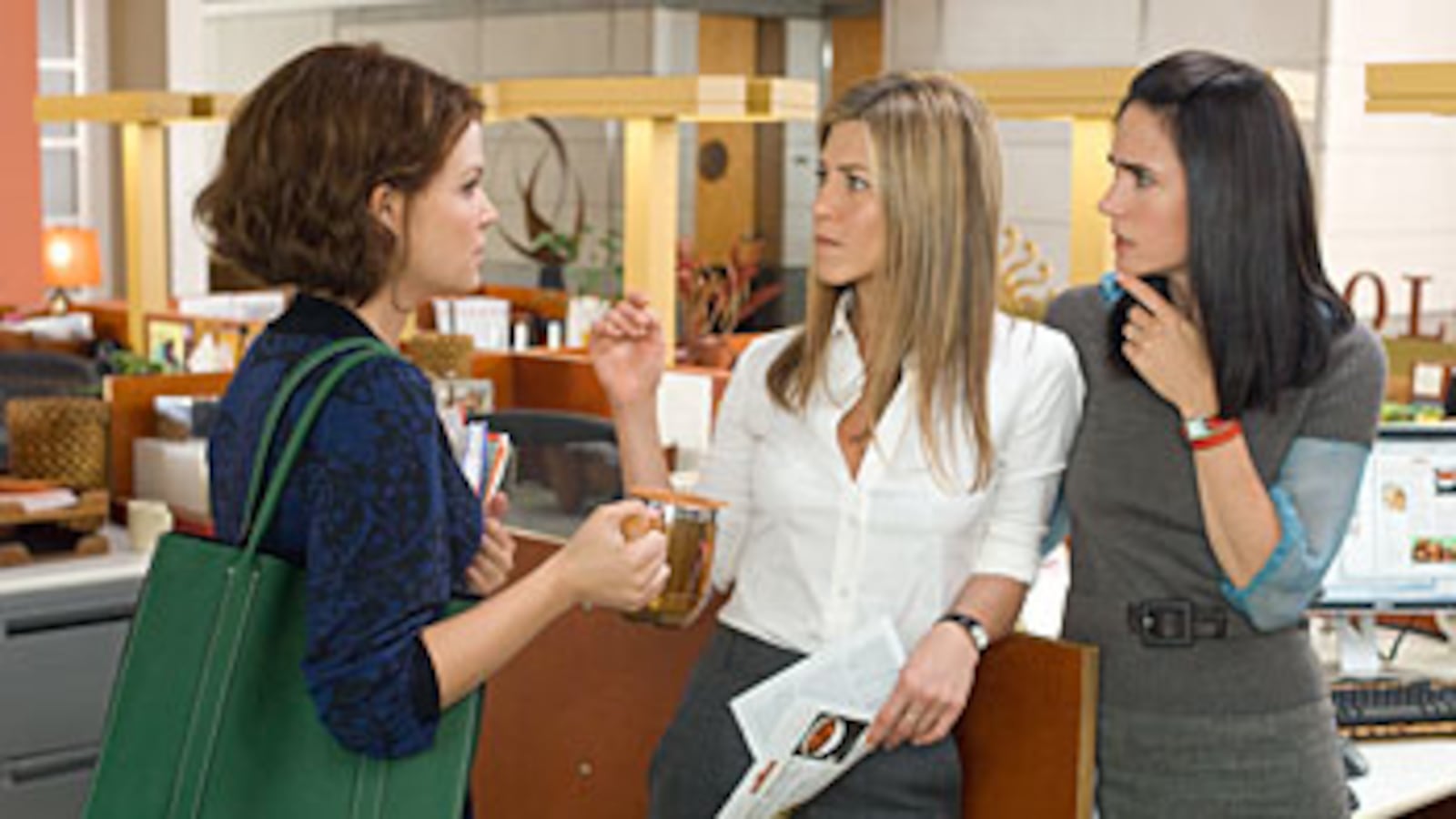
Having tremendously enjoyed the book, a work of friendly tough love aimed at getting good women to stop wasting time and heart on less-than-deserving men, I was excited to see He’s Just Not That Into You. So you can imagine my disgust (yup, disgust) when I walked out of the theater, having just watched one of the most depressingly misogynistic, manipulative movies in years, one that seemed to be adapted from another book altogether. One that could be titled He’s Just Not That Into You…Because You’re a Crazy/Annoying/Boring Downer.
For those of you who covered your ears during the book’s ubiquitous pop-culture moment, a CliffsNotes summary: Everyone (men included) should want to be with a person who treats them with love and respect. Don’t be ashamed of asking for these things; if the guy you like can’t give them, it’s time to move on. No amount of patience or cajoling will change a man who is uninterested or otherwise unavailable. At best, you’ll waste your time, and at worst, you’ll lose your dignity. Furthermore: Don’t let stories of women who’ve waited out a guy’s bullshit and ended up “happily married” convince you to exchange your standards for hope, because those stories are the very rare exceptions to the rule. Basic, common sense stuff.
The movie’s implicit message is: Listen ladies, if you just shut your yap about what you want, you’ll get it, OK?
Part of the reason the book was such a phenomenon was that authors, Greg Behrendt and Liz Tuccillo, are down-to-earth and nonsense-free.
It appealed even to people like me, who are generally allergic to self-help books, especially the ones with embarrassing pink covers. If anything, what I loved the most about HJNTIY was that it was so far removed from the kinds of dating books that had fungally multiplied in the last few years, books that encouraged head games ( The Rules) and obsessive pathologizing of male behavior ( Men Are From Mars, Women Are… zzzzz).
Unfortunately, after its journey through the razor blades of the Hollywood rom-com shredder, the book’s words have been jumbled and the message turned upside down. What’s left are five gloomy female “characters,” the main three being unlikable on a level so deep, so profound, as to be absolutely cringe-inducing.
It’s not just that watching them is no fun. The problem is that they’re portrayed as so lame, so pathetic, that any lesson they might learn about recognizing when a man is “not into them” is rendered utterly moot. Because we’re totally not into them either. Whereas the book operated on the assumption that its reader is a cool, smart, interesting lady who genuinely deserves more, this movie is yet another piece of proof that Hollywood still has severe trouble imagining such a thing.
The movie centers on Gigi, a pretty girl whose entire desperate existence seems based on two desires: getting a date, and making me wince. She is played by Ginnifer Goodwin, a smart actress I’ve liked in the past but who is now majorly on my shit list. I can’t decide to what degree she’s to blame, because she’s been handed such a limp part. But she chooses to exaggerate the most offensive edges of this underdeveloped role into a hideous caricature of neediness and obsession almost on a par (and I’m only kidding a little here) with Glenn Close’s rabbit-boiler in Fatal Attraction.
Possessing absolutely no discernable interest other than chasing men who don’t like her (and why should they?), she becomes obsessed with the advice of bar manager Alex ( Justin Long), the Greg Behrendt stand-in who gives her the magical HJNTIY advice. But we never really see her take it, because for the bulk of the movie she’s still behaving like a borderline psychopath. When she develops a crush on Alex that is clearly not reciprocated, the filmmakers decide that they’ve had enough of trying to deal with this “just not that into you” stuff (after all, the movie’s almost over and there are dots to connect) and despite the fact that Alex has been telling her for 90 minutes that you can’t change a man who doesn’t like you—no exceptions—he now realizes that Gigi, the clueless sap, is the love of his life.
It’s a mindboggling epiphany, because I can’t remember the last time I hated a woman so much. He shows up at her door, puppy-eyed, and whispers in her ear “you’re my exception.” Yes, the whole point of the book is crapped upon that literally.
Janine (Jennifer Connelly) is stuck in the frigid type-A role that for some reason Hollywood loves making women play (she has an almost autistic obsession with kitchen tiles, boo!). Her goof of a husband (Bradley Cooper with a terrible salon tan, and hair that, I swear, appears to be frosted) cheats on her with funky, busty yoga instructor Anna (Scarlett Johansson, an actress whose woman-hating performance has rendered her officially dead to me).
Connelly’s story is supposed to exemplify the wisdom “he’s just not that into you if he cheats,” but her character is such an acute, off-the-charts bummer, it’s as if the filmmakers couldn’t quite bring themselves to let her husband shoulder all the blame for his behavior. Once again, any positive affirmation that could be extracted from seeing a well-rounded, lovable woman decide she’s not going to put up with infidelity is lost due to the fact that Janine is such a morbid, asexual downer. No one, including her, acts very surprised when it’s discovered that he’s strayed. “I used to be fun,” she whimpers to her friends at the office. Really? Well then, how come we’re not allowed to see that character? Does Hollywood not believe that fun, sexy women get cheated on too? Why did she want to be with a guy with frosted tips in the first place? I have so many questions…
The only two characters who emerge from this debacle with any humanity are Neil and Beth (Ben Affleck and Jennifer Aniston), BF and GF in a seven-year relationship marred only by his refusal to get married. Props to Aniston and Affleck for giving these characters a spark of humor. However, the actors’ likeability can’t hide yet another bummer of a story that’s antithetical to the book’s empowering message.
At the film’s end, after Neil does some menschy business involving helping Beth do her dad’s dishes (it’s actually a nice touch), Beth decides she’s OK with not getting married, she just wants Neil. She knows he really loves her, and that’s enough. I would have been fine with this; post- Bride Wars, any relationship that doesn’t involve wedding-obsessed bridezillas is a relief.
But I knew it would be naïve to think the story would resolve there. Because, of course, as soon as she stops asking to get married, Ben rewards her with a proposal and the coveted blood diamond. So, just to be clear, the book that reassured women it’s not crazy to want to get married after you’ve been with a man for a few years, and moreover, that part of being an adult is asking for what you want, has been flipped into a movie whose implicit message is: Listen ladies, if you just shut your yap about what you want, you’ll get it, OK? We’ll marry you, but only after you’ve given up and realized it’s our choice, not yours.
I’m not denying the existence of clingy women, women overly obsessed with marriage, women who get overly obsessed with career and neglect their husbands. The problem is, Hollywood is overly obsessed with them. They are the go-to villians in the bulk of mainstream flicks that go to the bother of employing talented actresses. I guess I just thought that a movie based on a book that actually seemed to like women would be more into them.
Jessi Klein is a writer and comedian who has frequently appeared on Comedy Central, CNN, VH1, and the Today show. She also likes to think she has value as a human being aside from her numerous credits in the entertainment industry.






